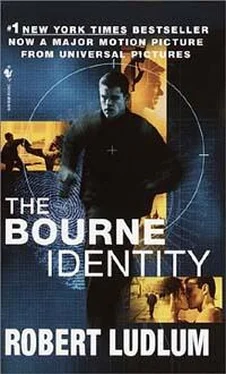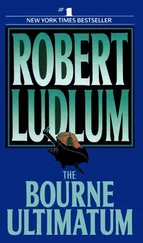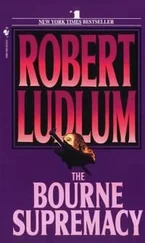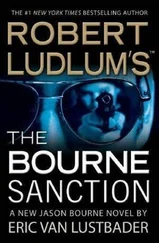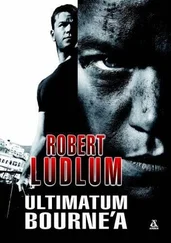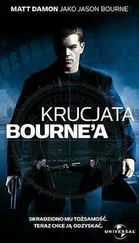When the irritated, goateed lawyer had nearly concluded his telephone conversation with an equally disturbed Antoine d’Amacourt, Marie held up her hand.
“Pardon me, but Monsieur Bourne insists that Monsieur d’Amacourt also include two hundred thousand francs in cash, one hundred thousand to be included with the bonds and one hundred to be held by Monsieur d’Amacourt. He suggests that the second hundred thousand be divided as follows. Seventy-five thousand for Monsieur d’Amacourt and twenty-five thousand for yourself. He realizes that he is greatly in debt to both of you for your advice and the additional trouble he has caused you. Needless to say, no specific record of breakdown is required.” Irritation and disturbance vanished with her words, replaced by an obsequiousness not seen since the court of Versailles. The arrangements were made in accordance with the unusual—but completely understandable—demands of Monsieur Bourne and his esteemed adviser.
A leather attaché case was provided by Monsieur Bourne for the bonds and the money; it would be carried by an armed courier who would leave the bank at 2:30 in the afternoon and meet Monsieur Bourne at 3:00 on the Pont Neuf. The distinguished client would identify himself with a small piece of leather cut from the shell of the case and which, when fitted in place, would prove to be the missing fragment. Added to this would be the words: “Herr Koenig sends greeting from Zurich.”
So much for the details. Except for one, which was made clear by Monsieur Bourne’s adviser.
“We recognize that the demands of the fiche must be carried out to the letter, and fully expect Monsieur d’Amacourt to do so,” said Marie St. Jacques. “However, we also recognize that the timing can be advantageous to Monsieur Bourne, and would expect no less than that advantage. Were he not to have it, I’m afraid that I, as a certified—if for the present, anonymous—member of the International Banking Commission, would feel compelled to report certain aberrations of banking and legal procedures as I have witnessed them. I’m sure that won’t be necessary, we’re all very well paid, n’est-ce pas, monsieur?”
“C’est vrai, madame! In banking and law … indeed, as in life itself … timing is everything. You have nothing to fear.”
“I know,” said Marie.
Bourne examined the grooves of the silencer, satisfied that he had removed the particles of dust and lint that had gathered with nonuse. He gave it a final, wrenching turn, depressed the magazine release and checked the clip. Six shells remained; he was ready. He shoved the weapon into his belt and buttoned his jacket.
Marie had not seen him with the gun. She was sitting on the bed, her back to him, talking on the telephone with the Canadian Embassy attaché, Dennis Corbelier. Cigarette smoke curled up from an ashtray next to her notebook; she was writing down Corbelier’s information. When he had finished, she thanked him and hung up the phone. She remained motionless for two or three seconds, the pencil still in her hand.
“He doesn’t know about Peter, she said, turning to Jason. “That’s odd.”
“Very,” agreed Bourne. “I thought he’d be one of the first to know. You said they looked over Peter’s telephone logs; he’d placed a call to Paris, to Corbelier. You’d think someone would have followed up on it.”
“I hadn’t even considered that. I was thinking about the newspapers, the wire services. Peter was … was found eighteen hours ago, and regardless of how casual I may have sounded, he was an important man in the Canadian government. His death would be news in itself, his murder infinitely more so… It wasn’t reported.”
“Call Ottawa tonight. Find out why.”
“I will.”
“What did Corbelier tell you?”
“Oh, yes.” Marie shifted her eyes to the notebook. The license in rue Madeleine was meaningless, a car rented at De Gaulle Airport to a Jean-Pierre Larousse.”
“John Smith,” interrupted Jason.
“Exactly. He had better luck with the telephone number d’Amacourt gave you, but he can’t see what it could possibly have to do with anything. Neither can I, as a matter of fact.”
“It’s that strange?”
“I think so. It’s a private line belonging to a fashion house on Saint-Honoré. Les Classiques.”
“A fashion house? You mean a studio?”
“I’m sure it’s got one, but it’s essentially an elegant dress shop. Like the House of Dior, or Givenchy. Haute couture. In the trade, Corbelier said, it’s known as the House of René. That’s Bergeron.”
“Who?’
“René Bergeron, a designer. He’s been around for years, always on the fringes of a major success. I know about him because my little lady back home copies his designs.”
“Did you get the address?’
Marie nodded. “Why didn’t Corbelier know about Peter? Why doesn’t everybody?”
“Maybe you’ll learn when you call. It’s probably as simple as time zones; too late for the morning editions here in Paris. I’ll pick up the afternoon paper.” Bourne went to the closet for his topcoat, conscious of the hidden weight in his belt. “I’m going back to the bank. I’ll follow the courier to the Pont Neuf.” He put on the coat, aware that Marie was not listening. “I meant to ask you, do these fellows wear uniforms?”
“Who?”
“Bank couriers.”
“That would account for the newspapers, not the wire services.”
“I beg your pardon?”
“The difference in time. The papers might not have picked it up, but the wire services would have known. And embassies have teletypes; they would have known about it. It wasn’t reported, Jason.”
“You’ll call tonight,” he said. “I’m going.”
“You asked about the couriers. Do they wear uniforms?”
“I was curious.”
“Most of the time, yes. They also drive armored vans, but I was specific about that. If a van was used it was to be parked a block from the bridge, the courier to proceed on foot.”
“I heard you, but I wasn’t sure what you meant. Why?”
“A bonded courier’s bad enough, but he’s necessary; bank insurance requires him. A van is simply too obvious; it could be followed too easily. You won’t change your mind and let me go with you?”
“No.”
“Believe me, nothing will go wrong; those two thieves wouldn’t permit it.”
“Then there’s no reason for you to be there.”
“You’re maddening.”
“I’m in a hurry.”
“I know. And you move faster without me.” Marie got up and came to him. “I do understand.” She leaned into him, kissing him on the lips, suddenly aware of the weapon in his belt. She looked into his eyes. “You are worried, aren’t you?”
“Just cautious.” He smiled, touching her chin. “It’s an awful lot of money. It may have to keep us for a long time.”
“I like the sound of that.”
“The money?”
“No. Us.” Marie frowned. “A safety deposit box.”
“You keep talking in non sequiturs.”
“You can’t leave negotiable certificates worth over a million dollars in a Paris hotel room. You’ve got to get a deposit box.”
“We can do it tomorrow.” He released her, turning for the door. “While I’m out, look up Les Classiques in the phone book and call the regular number. Find out how late it’s open.” He left quickly.
Bourne sat in the back seat of a stationary taxi, watching the front of the bank through the windshield. The driver was humming an unrecognizable tune, reading a newspaper, content with the fifty-franc note he had received in advance. The cab’s motor, however, was running, the passenger had insisted upon that.
The armored van loomed in the right rear window, its radio antenna shooting up from the center of the roof like a tapered bowsprit. It parked in a space reserved for authorized vehicles directly in front of Jason’s taxi. Two small red lights appeared above the circle of bulletproof glass in the rear door. The alarm system had been activated.
Читать дальше
